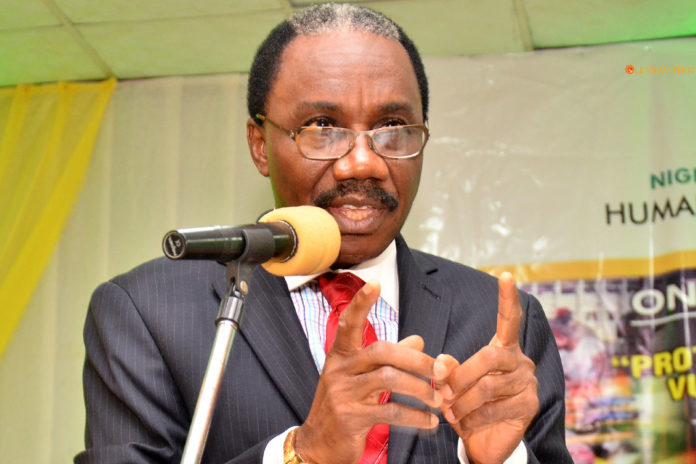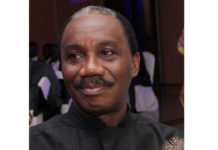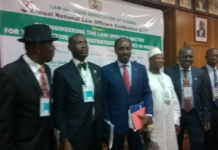Prof. Ernest Ojukwu, a Senior Advocate of Nigeria, is the immediate past Deputy Director General and Head of Campus, Nigerian Law School, Enugu. In this interview with OLADIMEJI RAMON, he argues that education is a more potent weapon against corruption than prosecution
A recent survey you conducted suggested that bribery of judges or corruption is the biggest problem of the judiciary; yet a few judges have been taken to court and some have been exonerated. Will you still say corruption is a reality in the judiciary?
Prosecution is not the evidence of the existence of corruption, and it is also not the evidence of a serious programme for the eradication of corruption; prosecution is the last and the least process of an anti-corruption war. In fact, if you graduate anti-corruption war, prosecution will take less than 10 per cent. And unless a regime or leadership understands that focus, it will never seriously fight corruption, because prosecution, sanction accounts for only about 10 per cent of the anti-corruption fight.
An anti-corruption programme is in education, orientation; that’s where 90 per cent of the job is. The Nigerian Bar Association is not leading in that. There is a five-year university programme but there’s no course on ethics in most universities. Meanwhile, our graduates learn what they do from the university; everything we do now as practitioners is learnt from the university – shunting, bribery and corruption, bribing of teachers, molestation of students by teachers, using money to campaign for election into the students representative council, is all there and it is growing in trend. So, we are training Nigerians from the university to become Nigerians. Unless we redesign our programme, we can’t handle it.
We must set the rules and enforce them. And then, there is a need for publicity on actions taken on anti-corruption; the more people learn, the more they are deterred and vice versa. Public disgrace is one major area. Discussion is another. In those days when I was the chairman of the Bar at Aba, we had magistrates who were accused of one or two acts of corruption; we’d take one or two lawyers and pay a courtesy visit to the magistrates and in the course of discussion we would confront the magistrates with the allegations. This person said they gave you so-so amount of money; I can assure you, one or two of the magistrates have become judges and I know the change of attitude. They may not be 100 per cent clean, but it affected them positively. Just a discussion. This we don’t do at the Bar. What we do is that someone writes a petition, and in some cases the petitions against lawyers and judges don’t see the light of the day, no discussion with the person who has been accused, and no serious or active ethics workshops for many years.
The Bar itself voted bribery of judges as their number one problem; they were not voting against judges, they were voting against lawyers who bribe judges. Judges were not the focus but the bribing of judges by lawyers. So, it is an inside problem.
Is there any hope that the Nigerian Law School might reconsider its decision on the admission of Law graduates from the National Open University of Nigeria?
Those who go to Open University to read Law know that they have no right to go to law school; Nigerians generally know the right thing, but there is a belief that at some point, things will change. The system is not transparent, so, nobody can say, exactly, what the result will be. We are misled by our own growing way of life that rules and regulations would not be obeyed or enforced.
However, there is nothing conclusive to say that if you study through the Open University, you can’t be a lawyer. Based on my experience as a Law teacher in the university for 15 years, and nearly 15 years as a teacher in the Nigerian Law School, I know, as a fact, that if we continue training our students on a traditional syllabus and traditional methodology, as we are doing, Open University is as good as any other LLB. You don’t need students to be in your class to pass exams, because that’s my experience. And when I was a young teacher I never insisted on students taking attendance. They were always enforcing attendance but I refused to enforce attendance because I refused to teach traditionally. If you engage students they would attend your classes but if you teach traditionally they would only attend out of compulsion. To that extent, Law students in Open University are not worse trained than those under our LLB programme.
But there is a policy problem. We had part-time legal education at some point in our universities and experience showed that some graduates did not actually take part in the training but had degrees. There is also the policy problem facing every profession relating to numbers. You must have heard from the current President of the Bar when he was inaugurating the Legal Profession Regulating Committee in January 2017 relating to admitting more lawyers than we can accommodate. That’s a policy problem. If the professional body feels that we have too many lawyers, they will do everything to tighten it up. Already, we are quarreling with the number coming from the full-time programme, so why open another floodgate?

If the Nigerian Law School continues to be run the way it is, then we can’t have more admissions, because there will be no place to manage the students. But if you change the tenor of the law school, as I have proposed many times before, where you deregulate the law school and allow private service providers, then you can admit more. In that situation there would be a central body that sets the curriculum, teaching method and the examination for all.
A situation where the Nigerian Law School houses students beyond its capacity and sets the examination for the same students itself creates pressure for the law school. The law school and any school in the country that has that kind of tenor will run into a pressure problem. But if you extract the examination from the law school and hand it over to an external body – the Council of Legal Education just like JAMB – there will be less pressure. Nobody pressures JAMB, but if your school sets the exam by itself, they pressure you. It is until that happens that we can allow anybody to read Law from anywhere and face the exams; train yourself and face the exams. And by that time you can still keep the policy of the profession, with low number, yet giving everybody an opportunity.
Despite being in the academics, you are also an active member of the Bar. The NBA is returning to the polls this year to choose a new set of leaders. How can the electronic voting system introduced two years ago be strengthened?
The world over, electronic voting is still a challenge and that’s why many nations have not moved to full-blown electronic voting; it is still a work in progress. One of the things that we need is a transparent or open system that people will understand primarily; that’s the first thing. There should be some form of demonstration on how what we want to deploy will work, some form of public demonstration. Secondly is that the system must technically give us the result in real time. One minute after the close of voting we should know the results, not one hour; because it is straightforward. If you are in a class and you are voting electronically, you should see the result immediately. If it’s timed for five minutes, after five minutes it stops and the result shows. We’ve seen electronic voting in the American Senate, once they start clicking, if it’s 10 minutes, after 10 minutes they stop and the result shows. That’s what we need, real time totaling of results.
Money has become a prominent feature of the NBA elections in the recent pass. Is there likely to be any difference this year?
I don’t know. You should ask the Bar, not me.
There is a committee set up by the NBA to look at the welfare of lawyers; among other things, the committee is proposing a minimum wage of N50,000 for young lawyers. Do you think that is enough?
The minimum wage is not for young lawyers; it is for all lawyers but the younger ones benefit more because they form the bulk of the employees. I will not like to comment on the exact amount of minimum wage because I will like this to be a decision of the Bar but people like me support to the highest level a prescription and an enforcement of a minimum wage for lawyers but the actual amount, we should discuss it and agree.
In what more ways can the NBA respond to the needs of lawyers?
First, the NBA should embark on a robust capacity building for lawyers; continuing legal education programme for lawyers, that’s a major vehicle to create a relationship with the Bar. Every professional body in the world, 80 per cent of their work is capacity building. Very few lawyers, for example, have an idea about Bitcoin. Meanwhile, it is a money-making venture; even carpenters are doing it now. The Bar should run workshops on it. The Central Bank of Nigeria recently said they are not going to make rules for Bitcoin because they are still studying the field. This is where the Bar should take leadership; run a workshop on it, look at what is happening in other countries, agree on whether or not we should have rules; if we agree, produce a rule and send it to the Central Bank, this is the job of the Bar. If you have something like that, lawyers will be interested as it primarily opens job spaces for lawyers; and, of course, welfare.
Apart from insurance for death, we should have insurance for health. If you have that, people will want to belong to the Bar because health care is expensive.
Talk about young lawyers; between 5,000 and 7,000 lawyers are graduated from the law school every year; the only obligation the Bar has is to push them to the Supreme Court to go and enrol, after that they disappear into the cloud. There’s no induction for them, there’s no transition programme, there’s no incubator, no canopy, no discussion about them, no career planning and counseling programme, not one single seminar. And so, they just push 7,000 people out there. If we have these activities people would yearn to belong.
There is no single competition run by the Bar for the growth of law faculties and development of law students in the country. In other places, the Bar runs such competitions in several aspects of Law. By the time Law students are leaving the law faculty in many parts of the world, they already found a career path, because it is through those platforms that students are mentored into careers and people come out of the university knowing already where they are going to.
There are hundreds of activities that the NBA can embark upon that will attract donors. Access to justice, human rights are open areas. What about our ethics; are there are any discussions? Meanwhile, if you ask 50 lawyers what the major challenge of the profession is, they will say ethics, corruption, but the Bar has not run active workshop on ethnics for many years.













